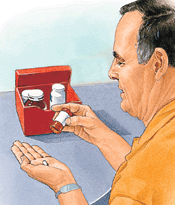Type 2 Diabetes
Taking Medication
You may take diabetes medication to help you manage your diabetes. Medication doesn't take the place of eating right and exercising, and it won't cure your diabetes. But it can help you keep your blood sugar in target range.
Pills for Diabetes

There are several types of pills for diabetes. Sometimes two or more medications are used together. These pills are not insulin. They help control your blood sugar in different ways. Certain medications may:
- Cause your body to make more insulin.
- Regulate the amount of glucose in your blood.
- Help your insulin to work better.
- Delay the breakdown of starches and sugars you eat.
Taking Diabetes Pills
Follow these tips for taking your medication safely:
- Take your diabetes pills as directed. Know what to do if you miss a dose. Ask your healthcare provider whether you should take pills before or with meals.
- Some pills may increase your risk for low blood sugar. Watch out for symptoms, and tell your healthcare provider if you have low blood sugar often.
- Alcohol may affect your diabetes medications. Talk to your healthcare provider about whether it's okay for you to drink alcohol.
If You Need Insulin

Your doctor may prescribe insulin to help you manage your blood sugar. Insulin won't work if it's swallowed, so it must be injected into the tissue under the skin. You may take diabetes pills in addition to insulin. If you take insulin, be sure to watch out for symptoms of low blood sugar, and always carry a fast-acting sugar with you.
Insulin Delivery Methods
Insulin injections are not hard to learn to do. A member of your healthcare team will show you how. Several devices can be used for taking insulin: a needle and syringe, an insulin pen, or an insulin infusion pump. Your healthcare team will help you choose the best method for you. New ways of taking insulin may be available in the future.
Medications for Other Problems
Other medications that are prescribed for you or that you buy over the counter can affect your blood sugar levels. Or they may interact with your diabetes medications. When you visit your healthcare provider, bring all your medications with you. Before buying medication in the drugstore—including aspirin, cold tablets, herbs, or vitamins—always tell the pharmacist that you have diabetes.